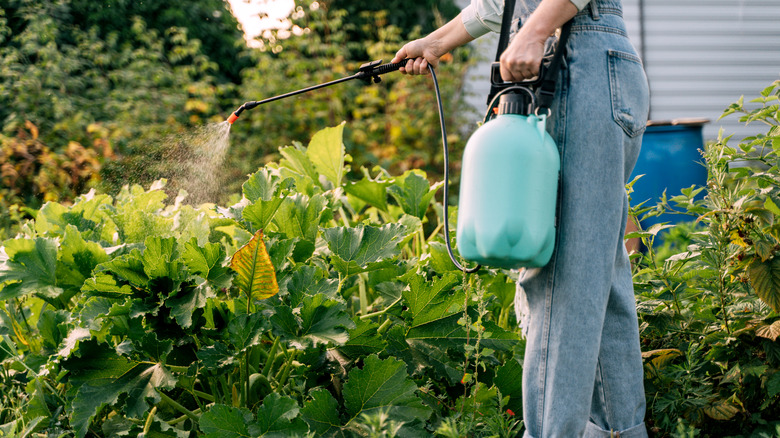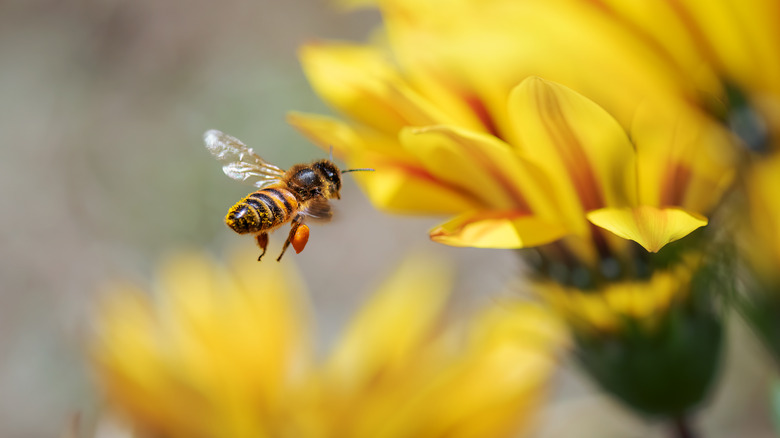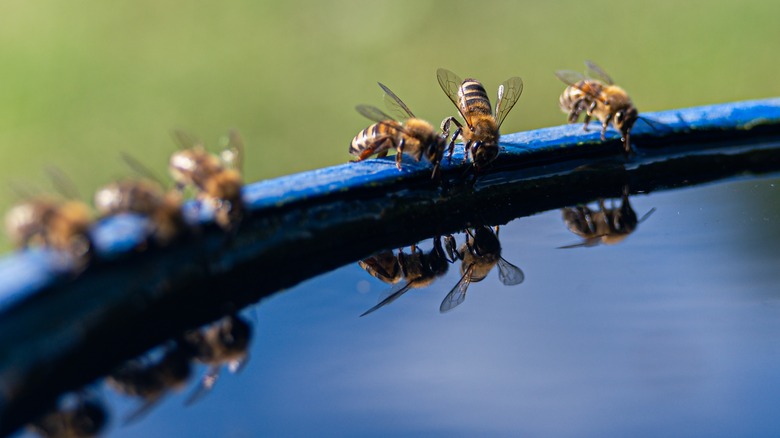The Right Way To Spray Pesticides To Decrease The Chances Of Harming Bees
Bees are one of the most crucial creatures on our planet and a vital member of the food chain. Not only do they supply us with honey, but bees also pollinate thousands of flowers, fruits, and vegetables. You might not realize how important bees are to our survival, but the USDA says one out of every three bites of food we eat is the result of pollination. Unfortunately, spraying pesticides to rid your garden of bothersome pests can also affect these helpful insects. Therefore, if you must spray pesticides, always spray at night to lessen your chance of harming any bees within the area.
The population of honeybees and bumblebees is on a decline in North America. Our rapidly-changing world is encroaching on their living spaces as bees lose their habitats in favor of urban development and industrial agriculture. This dynamic can also bring the removal of native plants, which bees rely on for food and shelter. Adding pesticides to the mix is only making the situation worse.
While this is a widespread problem, you can still do your part to ensure there are still productive little pollinators in our ecosystem. Here's what to know about spraying pesticides in a way that won't harm these good insects in our gardens and yards.
How pesticides harm bees
Honey bees forage on days without rain when temperatures are above 61° then return to their hive in the evening. Depending on the weather, they will remain near the hive or venture around a mile away, which increases their chance of exposure to chemicals. When you make bee-friendly choices such as spraying pesticides at night, you lessen the chances of the bees coming in contact with harm. If you need to spray around your plants and flowers with an insecticide, carefully check for an Environmental Hazards Statement on anything you buy, as this will list what creatures may be at risk. You should also always avoid spraying flowering plants directly and during dewy conditions, as dew can strengthen the spray residue.
Many pesticides, in particular, neonicotinoids, are highly toxic to bees. The ingredients can not only weaken or kill bees, but also disrupt their navigational systems, lower their honey production rate, and make them more susceptible to disease. Pesticides have the ability to harm a single bee who comes into contact with it, or a whole bee colony after a worker bee introduces it into the hive after returning from pollination. The latter scenario is much more devastating as this can affect a large bee population, especially when a typical colony can have over 60,000 bees.
Bees can come into contact with the pesticide through direct contact or residue, so changing how you spray pesticides in your garden is only one small way to help bees. Here are a few more.
Other ways you can help local bees
In addition to making smart decisions about pesticides in the garden, you can be bee-friendly by starting your own pollinator garden. This flowering haven rich with their favorite plants, shrubs, and flowers is a great way to help your local bees. Focus on planting native plants, as these have a good nectar supply and are more drought-resistant. Look to add bee-friendly flowers such as sunflowers and bee balm. Bee balm also offers the added bonus at repelling mosquitos from your lawn!
All of those bees buzzing in your yard will work up quite a thirst. Like other creatures, bees need hydration to keep going, and might accidentally drink from a puddle where pesticides are present in the soil. In particular, honey bees will bring water droplets to cool their hive, using it to keep a constant temperature within their home. As a homeowner, you can help with bee hydration by adding a few stones to your existing birdbath or setting out a small, shallow container in a shaded area. Fill the dish with a couple of rocks, then add water, being careful to not cover the whole rock. The bees can land on the rocks and have a safe, refreshing drink. Keep an eye on the dish and refill as needed. By following these tips and changing your pesticide use, you can ensure the world is a bit brighter for the neighborhood bees.


